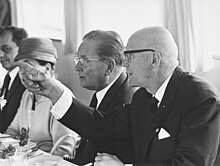Finland–Yugoslavia relations
 | |
Finland |
Yugoslavia |
|---|---|


Finland–Yugoslavia relations were historical foreign relations between Finland and now split-up Kingdom of Yugoslavia or Socialist Federal Republic of Yugoslavia. Both countries gained their independence during or in the immediate aftermath of the World War I and the collapse of Austria-Hungary (Yugoslavia) or Russian Empire (Finland). Two parties established formal bilateral relations in 1928.[1] Two countries developed their relations after the end of the World War II and 1948 Tito–Stalin split. At the time neither one of them was a part of either Eastern or Western Bloc in the Cold War divided Europe. Both countries perceived development of relations among non-bloc neutral European states as a way to avoid isolation and preserve certain level of independence without alienating major powers. Belgrade however perceived that in deeply divided Europe there was shrinking maneuvering space for neutral countries and followed the development of what will be called process of Finlandization with great concern. It therefore turned its focus on new allies among former colonies and mandate territories outside of Europe where it developed its policy of equidistant active neutrality via its activities in the newly founded Non-Aligned Movement.
Two countries developed noticeable cultural exchange from 1960s onward.[2] The fact that ambitious small countries in periphery or semi-periphery such as Yugoslavia and Finland were frequently capable to use superpowers rivalries to its own disproportional advantage motivated some scholars of the era (e.g. Tvrtko Jakovina) to focus on what they called pericentric studies of Cold War.[2]
Non-Aligned (Yugoslavia,
See also
- Yugoslavia–European Communities relations
- Group of Nine
- Finno-Soviet Treaty of 1948
- Croatia–Finland relations
- Finland–Serbia relations
- Views on Enlargement of NATO in Finland, Serbia and Croatia
- Death and state funeral of Josip Broz Tito
- Yugoslavia at the 1952 Summer Olympics
- Finland at the 1984 Winter Olympics
- Finland–Soviet Union relations
- Neutral and Non-Aligned European States
Further reading
- Kullaa, Rinna (2012). Non-alignment and Its Origins in Cold War Europe: Yugoslavia, Finland and the Soviet Challenge. London; New York, N.Y.: I.B. Tauris.
- Statovci, Pajtim (2017). My Cat Yugoslavia. Helsinki: Otava.
References
- ^ "Bilateral Issues: Finland". Ministry of Foreign Affairs (Serbia). Retrieved 25 August 2020.
- ^ .
- ^ "An Almost Forgotten Legacy: Non-Aligned Yugoslavia in the United Nations and in the Making of Contemporary International Law". Ryoichi Sasakawa Young Leaders Fellowship Fund. 16 November 2017. Retrieved 25 August 2020.



